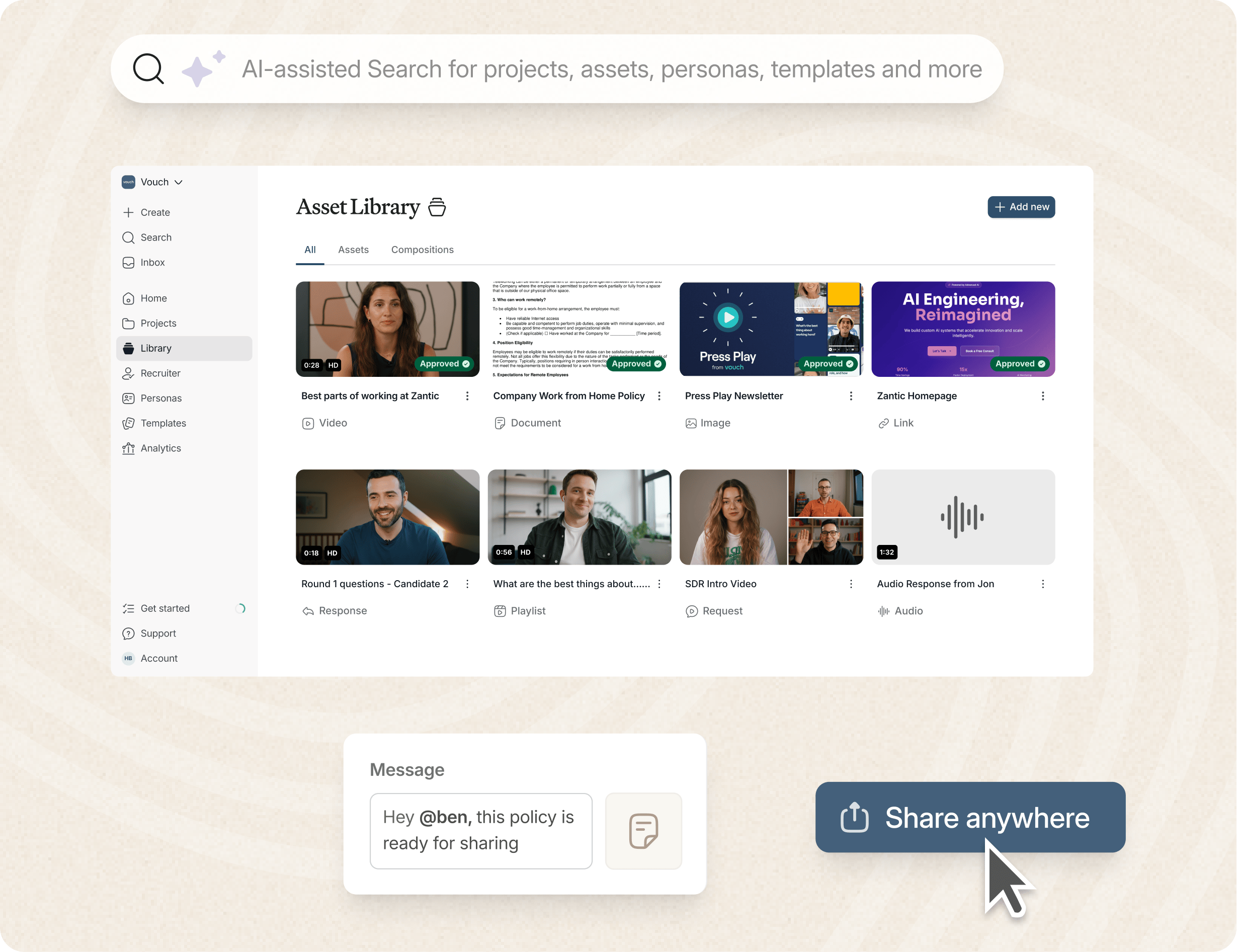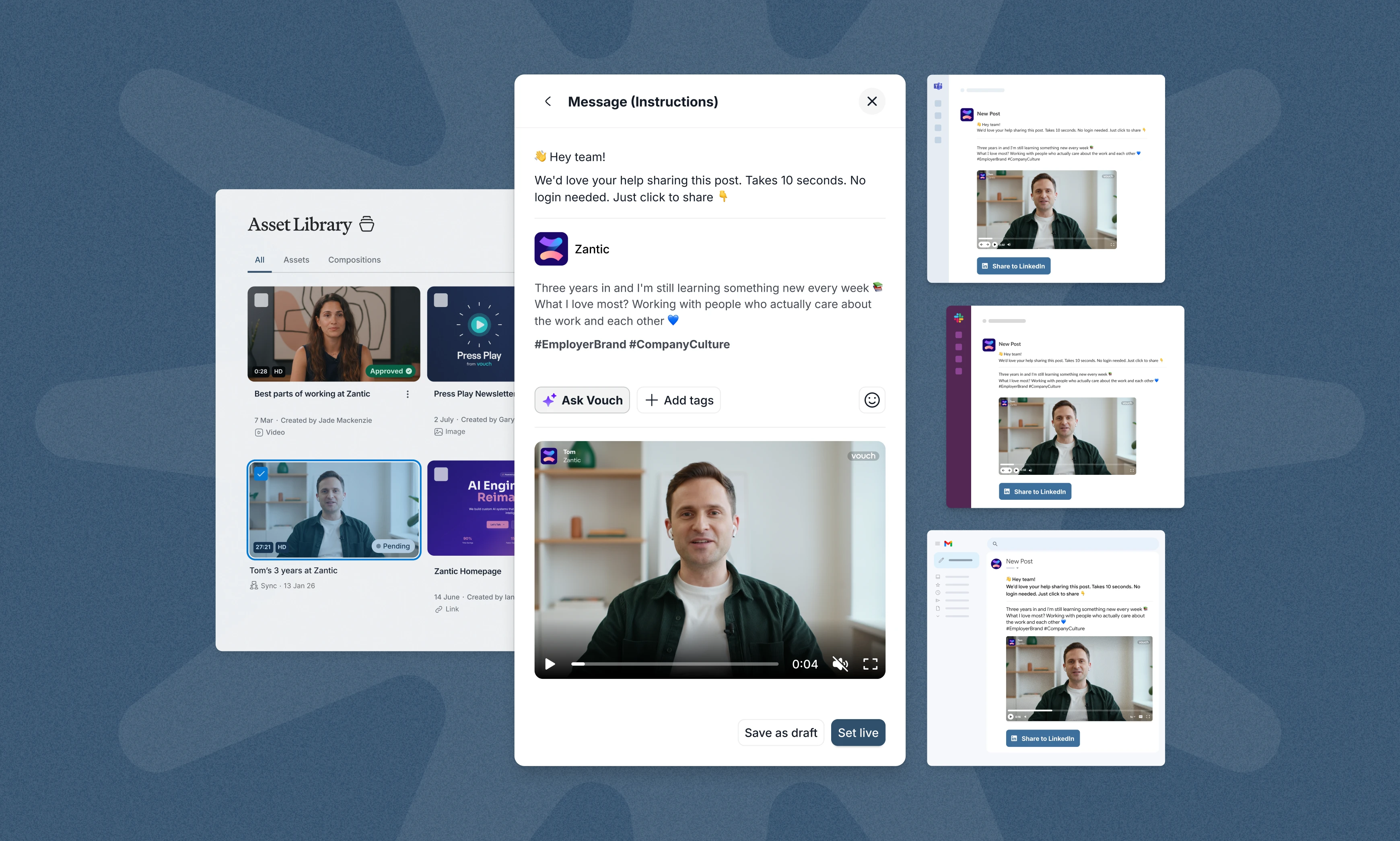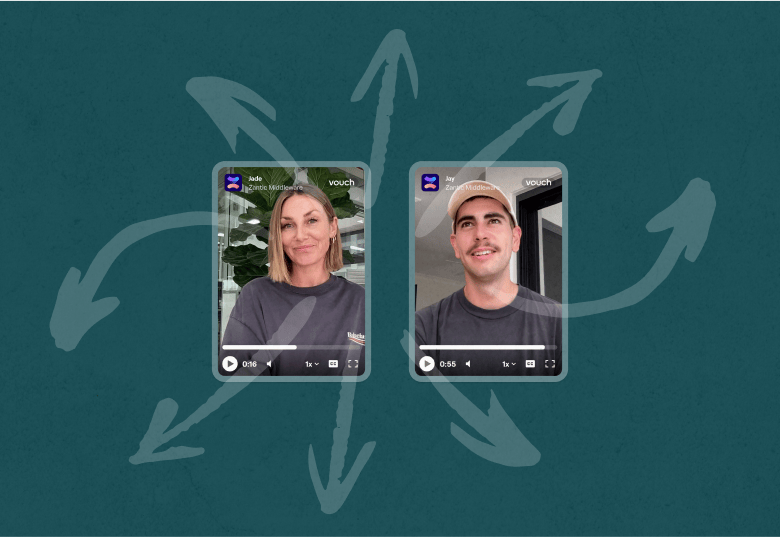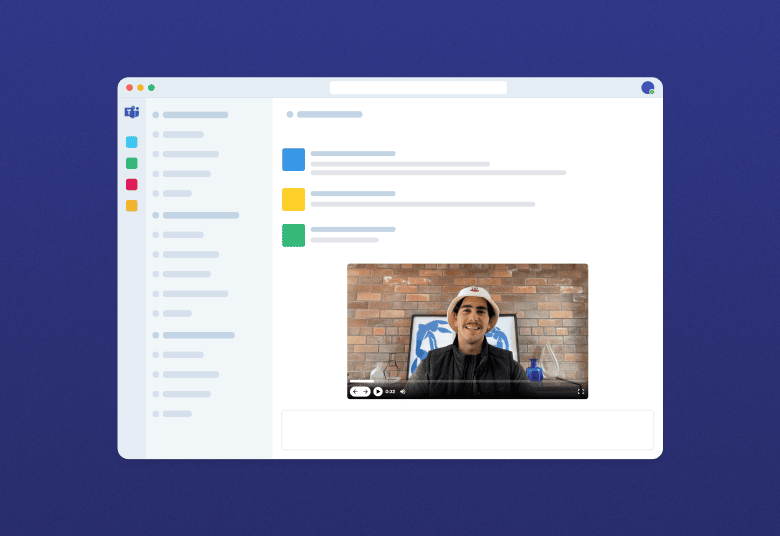Employee recognition programs have become a game-changer in 2026, especially in maintaining a positive company culture and boosting your employee retention.
If you're looking to reduce turnover and increase employee engagement, recognizing your employees' hard work on a regular basis is key.
Simple gestures like public praise or a small tangible reward can have a huge impact on morale and performance.
Below are 13 effective and creative ideas for employee recognition, supported by real data to show why they work.
Let's get started.
1. Public Recognition
Public recognition, whether it's a shout-out in meetings, personalized video messages like Vouch, emails, or on your company's social media, can significantly boost employee morale.
Recognizing employees publicly can also reinforce positive behavior across the entire team.
Statically, 44% of employees who receive public recognition report higher levels of engagement compared to those who don't. (Workman)
2. Peer Recognition Programs
Peer-to-peer recognition is a highly effective way to build a culture of appreciation within your team.
When employees recognize each other's contributions, it strengthens team morale and fosters a sense of belonging.
Statically, companies with peer recognition programs are 35% more likely to see an increase in employee engagement than those without. (SHRM)
The AI-enabled workspace for talent teams.
- Unified workspace for talent teams
- Accelerate hiring with AI tools
- Auto-generate polished hiring and employer brand content
- Easily repurpose assets across all channel

3. Gift Cards as Tangible Rewards
Tangible rewards like gift cards can be a quick, easy way to say "thank you" for a job well done.
They allow employees to choose a reward that's meaningful to them, whether it's a favorite restaurant or online shopping.
4. Handwritten Notes
A handwritten note may seem old-fashioned, but it's one of the most personal ways to show appreciation. Whether on a sticky note at their desk or mailed to a remote worker, this small gesture can create a meaningful connection between employees and leadership.
Statically, 52% of employees say a handwritten note makes them feel more valued than any other form of recognition. (O.C. Tanner)
5. Employee Recognition Software
Implementing employee recognition software makes it easier to consistently recognize employees. These tools allow for instant, trackable recognition, ensuring no achievement goes unnoticed.
Statically, 80% of businesses using recognition software report higher employee retention. (WorkTango)
6. Company Swag for Achievements
Offering company-branded items like T-shirts, mugs, or tech gear as rewards for employees' accomplishments can build company pride while serving as a tangible reminder of their hard work.
Statically, 67% of employees say they appreciate receiving branded company swag as part of a recognition program. (Incentive Research Foundation)
7. Special Employee Appreciation Events
Recognizing employees through fun, company-wide events like virtual parties or in-office celebrations creates a positive company culture and helps keep employee morale high.
Statically, teams that participate in regular employee appreciation events report 31% lower turnover rates. (Assembly)
8. Achievement Awards for Extra Effort
Implementing a formal achievement awards program, such as "Employee of the Month" or "Team Player" awards, gives employees something to strive toward. These awards can be presented in front of the entire team to make the recognition even more memorable.
Statically, 50% of employees say they are more likely to stay at a company that offers formal recognition programs. (Gallup)
9. Private Praise
Offering private recognition and one-on-one meetings helps you connect with employees on a more personal level. Sincere verbal praise in these settings can make employees feel truly valued without the pressure of public recognition.
10. Professional Development as Recognition
Investing in employees through professional development opportunities, such as certifications or courses, shows them you value their contributions and are committed to their growth. This can be a great way to retain top talent.
Statically, 87% of millennials say professional development and career growth opportunities are important when considering a job. (LinkedIn Workplace Learning Report)
11. Personalized Recognition
Tailoring recognition to the individual, whether they prefer private or public acknowledgment, makes the gesture more meaningful. Some employees may love the spotlight, while others might value a quiet thank you or personalized rewards.
12. Celebrating Milestones
Celebrating key milestones like work anniversaries or project completions shows employees that their long-term contributions are recognized. It's a way to reinforce the idea that they are an integral part of the company's success.
13. Pulse Surveys to Measure Impact
Conducting pulse surveys or company temperature checks can help you measure the effectiveness of your recognition programs.
Ask your employees how they feel about current recognition efforts, and use the data to make adjustments.
Statically, 36% of employees say they've considered leaving their jobs due to a lack of recognition. (Forbes)
FAQs
What are the benefits of employee recognition?
Recognition improves morale, lowers turnover, and boosts productivity.
How often should employees be recognized?
Employees should be recognized regularly, ideally on a daily basis, with more formal recognition happening quarterly or annually.
What's the most effective type of recognition?
A mix of peer recognition, public praise, and private acknowledgment works best to cover all employee preferences.
Is recognition effective for remote employees?
Yes! Digital tools and virtual shout-outs can make remote employees feel just as appreciated as in-office staff.
How does employee recognition impact retention?
Regular and meaningful recognition can significantly reduce turnover, as employees feel more valued.
What's the ROI of employee recognition programs?
Companies that prioritize recognition see higher engagement, better performance, and lower turnover, directly impacting profitability.
How can I create a culture of appreciation?
Start by encouraging frequent, sincere recognition at all levels, from leadership to peer-to-peer, and make it a core part of your company culture.
Summary
When done right, employee recognition has a direct impact on your employee performance, engagement and retention.
These data-backed ideas show that building a culture where employees feel valued and motivated will go the extra mile.
With consistent recognition efforts, you can strengthen your company culture and see tangible improvements across the board.
Whether you're a small business or a multinational corporation, the positive impact of appreciating your workforce can't be overstated.
With employee turnover at an all-time high, it's vital to create a culture of recognition to keep your team motivated, productive and engaged.
Transform Your Employee Recognition With Vouch!
Loved by companies like Canva, Nike, Cisco, HubSpot, Amazon, and more, tools like Vouch make leveraging video in your business communication and recruitment remarkably easy.
Be sure to book a Vouch demo today and chat with a video content expert.
You might also like

Elevate Your Brand Today With Vouch
Discover how Vouch can accelerate talent acquisition while helping you stay on-brand.






